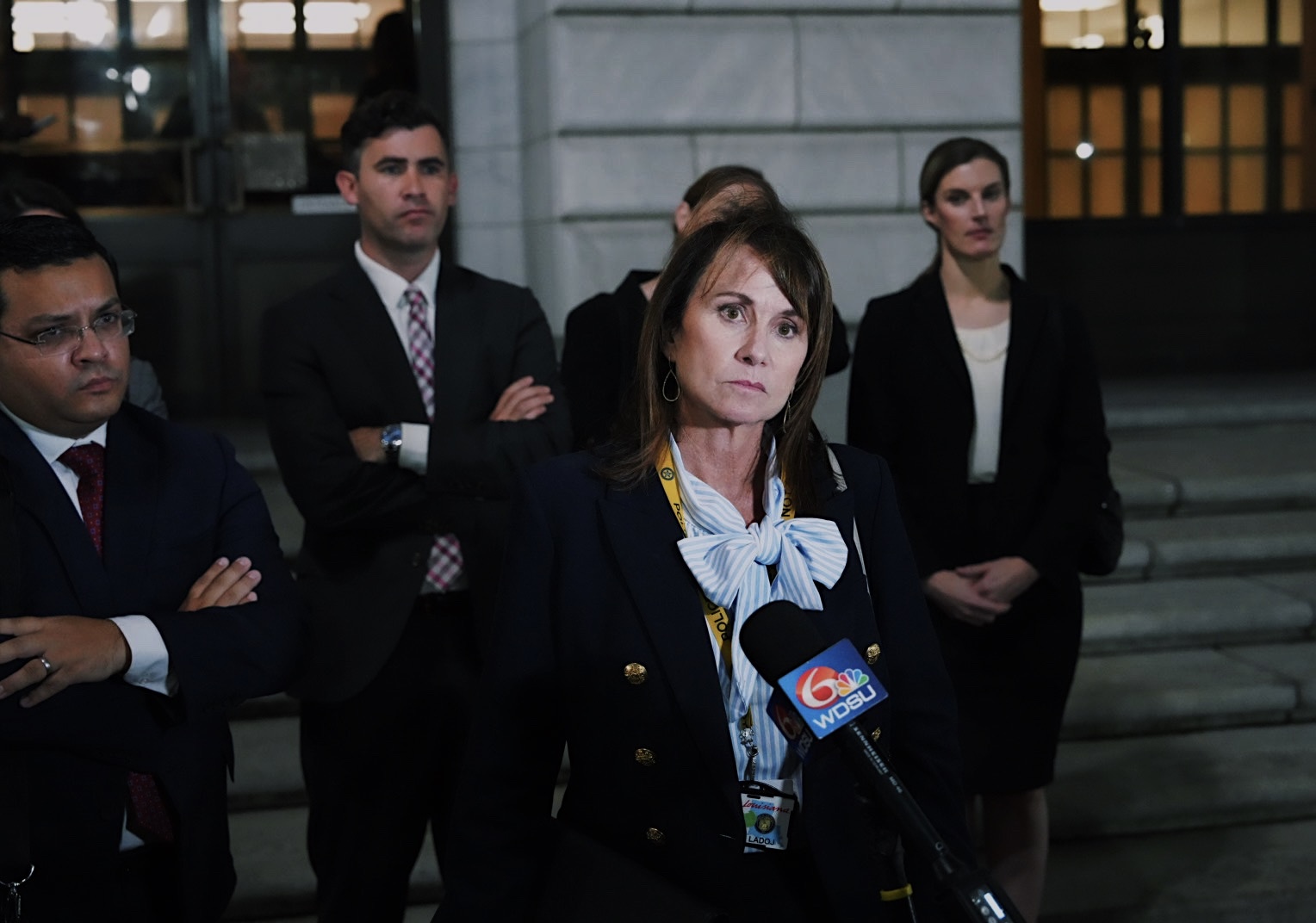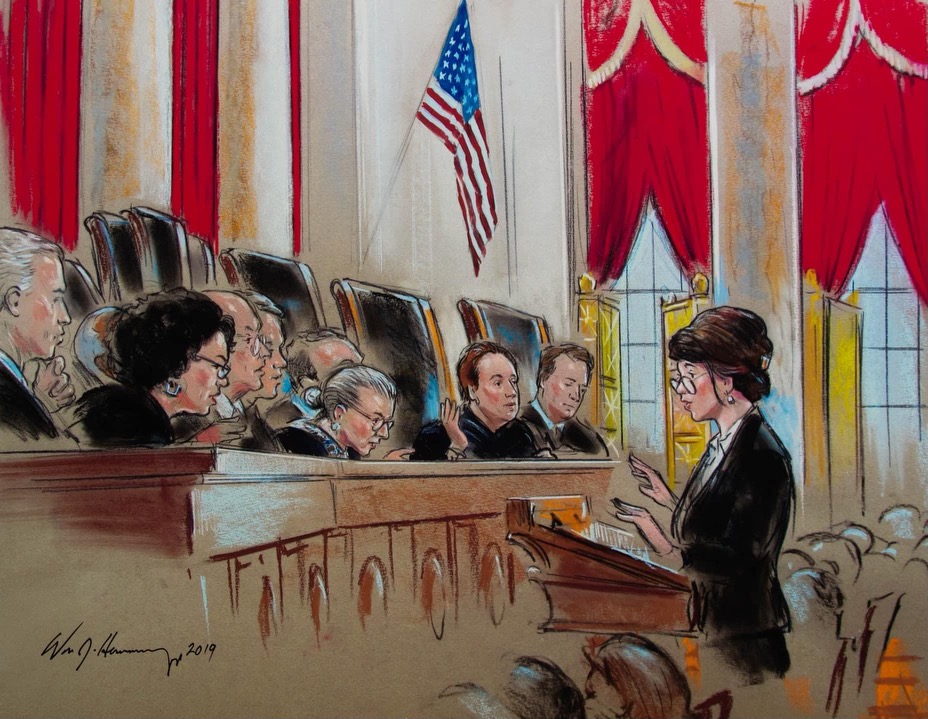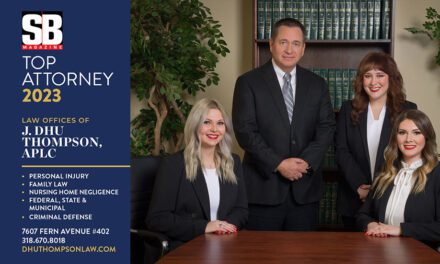By Kevin Hinson
Attorney General Liz Murrill is a trailblazer in the state of Louisiana. Prior to being elected as Louisiana’s “top cop” in 2023 with 67% of the vote, Murrill was the state’s first Solicitor General starting in 2015, a position still not present in every state. This means she represented Louisiana at the U.S. Supreme Court, and this undoubtedly led to her emerging among her peers as a particularly fierce litigator with sharp legal acumen. Born in New Orleans and raised in Lafayette as an eighth-generation Louisianian with a J.D. from LSU’s law school (where she also taught for ten years), Murrill is a Cajun’s Cajun who also has “a mean crawfish etouffee recipe” and is a mom of four boys. Her fights on behalf of Louisiana are ongoing, and SB got to sit down with the Attorney General to find out how it’s all going.
You were Louisiana’s first solicitor general…why didn’t we have one before?
I can’t answer that. Buddy Caldwell (Attorney General from 2008 to 2015) didn’t seem real interested in creating the position. I started with Jeff in 2016 right when he got elected, and he always had intended to create the position. Probably a little over half of the attorney generals in the country had solicitor generals at that time, most of the other ones had a chief appellate officer or somebody like that, but not somebody under the title of “Solicitor General” who really coordinated all the Supreme Court litigation and all the federal appeals for the state, not just for the office. So that’s what Jeff wanted to create and I think partly he just understood that our offices were having an enormous impact in the United States Supreme Court, and that it was important for us to coordinate with other attorney generals around the country through a single point of contact and develop an office of people who had the kind of expertise to do that kind of specialized work, and that we were going to be better represented as a state if we had people who specialized in paying attention to what was happening in our federal court circuits and what was happening in the U.S. Supreme Court and were capable of arguing those cases at that level.



(Regarding the Ten Commandments Bill over last summer, H.B. 71) What were the court’s objections to it?
His primary objection (Judge deGravelles of the Middle District of Louisiana in Baton Rouge) is that he believes that it violates the Establishment Clause of the federal Constitution. We don’t believe that it does. There’s an element of this case that’s in pretty much every constitutional challenge. They brought what’s called a “facial challenge” to the law, it’s a pre-enforcement challenge, it means they want to block the law before it goes into effect. They tried to bring this pre-enforcement challenge and claim that there is no possible way, which is the legal standard for a facial challenge, that there is no way that this law could ever be interpreted or applied in a constitutional manner. That’s the burden that they must prove that it’s unconstitutional. Judge DeGravelles agreed with that, we do not agree with that, and to illustrate why that’s wrong, we created posters. We followed the directions in the law, and we created some illustrative posters, and we put them in our briefs so that we could show the court that you can apply it, you can interpret it, and you can apply it constitutionally. There are two Supreme Court decisions that kind of create some navigational beacons in this very particular area, and one of them says if you post the bare Commandments on the wall then it’s going to violate the Establishment Clause. The other one says if you post it in a historical context then it probably doesn’t, but that’s going to depend on the facts. What we said was ‘we’re in this camp, not in this camp.’ He just didn’t agree with us so now it’s up on appeal to see how it comes out with the courts of appeal.
Any idea when that hearing is?
We had oral argument already in the Fifth Circuit. Just based on my takeaway form the oral argument, I don’t necessarily expect us to win at the panel level, but we would ask the court to go en banc, which is where you get all the active judges on the court. If we don’t get that, then we’ll go to the Supreme Court of the United States. I think the plaintiffs will do the same thing. If we win at either level, then they will take it to the United States Supreme Court. So ultimately, I think this lands in the United States Supreme Court.

Would you reprise your role as Solicitor General to argue that?
(laughs) I don’t know, I might. I always have the prerogative to do that…U.S. Supreme Court cases take an enormous amount of preparation. You don’t go in half ready, you gotta’ be fully ready, and I have a lot of responsibilities as Attorney General, and I just have not felt like it was prudent for me to either set all of that aside to go prepare for the Supreme Court, and I think it would be a disservice to the case and the state if I tried to do it without the right amount of preparation. So right now, that’s Ben’s job (Benjamin Aguinaga, Louisiana’s current Solicitor General, whose former LSU law professor once described as “the definition of extraordinary” and one of only two LSU law grads to ever land a Supreme Court clerkship) and that’s what Ben does. He’ll be in the Supreme Court arguing the redistricting case (Louisiana v. Callais) that we have scheduled for oral argument on March 24th.
How do you anticipate it ending?
I feel confident that we will prevail. I think that the law is constitutional, if I thought that it had some defects, I would’ve told the legislature that when they were moving it through. There were some amendments that were put on in the Senate that I think probably saved it and make it constitutional, but if there is a way to apply it constitutionally then the judge should have upheld it. I think our posters show that you can and that we did, and the posters so far, nobody’s actually posted a poster, the ones that have been distributed, as I understand it, some have been distributed up in north Louisiana, I think they are using posters that we approved, and so I told those school boards that if they are going to post posters then they should post the ones that we approved and that we would defend them if they’re sued (which was predicted in a droll manner by Governor Landry prior to signing the bill). So, I think there’s a couple of parishes that are preparing to do that.
What cases from Attorney General Landry are still pending? Are you fighting them now?
Yes, obviously I took over everything that was still pending in the entire building, so there’s lots of cases that are carryover cases from Jeff’s tenure as Attorney General. I haven’t dismissed any case that I can think of…so I’m continuing to lead now on all that litigation. The federal litigation where we were suing the president were all cases that I had started under Jeff, and so we’re seeing those kind of play out now with a new administration. That’s kind of what happened the last time; when Trump won the first time, cases kind of go on hold, the courts kind of pause everything, usually on request of the federal government while they reassess their position in cases. When Biden came in, he did the same thing with a bunch of Trump regulations and litigation that was then pending against Trump regulations. Trump is doing the same thing now.
You argued five cases before the Supreme Court…how have they played out? Were they concluded?
They’re all over. The first case was McCoy v. Louisiana (decided May of 2018), it was a criminal case out of Bossier. That case is not over…his conviction (McCoy’s death sentence) has been vacated, he got a new trial. He had a wife he was separated from, and he had been accused of some domestic violence with her…they had moved her to Dallas to keep her safe, and so he went to her parents’ house and shot both her parents point blank in the head, and then shot his own stepson, who was 16, maybe 17, he had a scholarship to play basketball at Louisiana Tech, just a great kid…dragged him out of his bed and shot him in the head. The question for the court was not whether he was insane, because he had passed the insanity test for being subject to trial, but his lawyer believed that he did not really have the proper capacity to make decisions about his own defense, even though that had been kind of rejected by the court. His lawyer stood up and declared that he was guilty and did that over the objection of his own client. The fact pattern of that case had been waiting 12 years to come up at the United States Supreme Court…he conceded his client’s guilt over the objection of his client, and that’s when Justice Ginsburg said, ‘Twelve years ago I said, if this ever came up, that would be a different case.’ They granted writs and they granted him a new trial. My argument in that case was that it should have been treated as an ineffective assistance of counsel case, which has a different appellate path than just a straight up prejudicial error that you get a new trial on. They gave him a new trial and Bossier is still coping with trying to try him again because he does happen to have some mental issues.
The second case I argued was Ramos (Ramos v. Louisiana, decided in April of 2020), the non-unanimous jury verdict case. Ramos was a case about the Incorporation Clause and the Sixth Amendment, and whether unanimity was required based on our federal history (Louisiana previously allowed 10 or 11 jurors to convict for a felony). The question for us on our non-unanimous jury requirement was whether the Sixth Amendment superseded any kind of state rule that we might have and required us to have unanimity to convict somebody in a felony case. The Court, not surprisingly, said that you do. We had already changed our law (in January 2019), so what I was dealing with was an impact that was going to happen to all the cases that pre-dated our change to the state constitution that went to unanimity on our own. I handled all the cases from all the DAs in state court and in federal court.
The third case that I argued was June Medical v. Russo (decided in June of 2020). That dealt with our admitting privileges law…Ramos and June Medical both ended up becoming foundational cases as precedent to overrule Roe v. Wade in Dobbs. While we lost in both cases, I always talk about how you must think about how you want to lose a case not just how you want to win a case, because you can lose cases in ways that help you later, especially in Supreme Court litigation, and that was true with Dobbs. Both of those cases are littered all throughout the Dobbs opinion as precedent for overturning Roe v. Wade. What happened after that is that even though I lost the case, Dobbs basically flipped everything back, so it turned everything back to the states, it reversed Roe v. Wade, and it allowed the law that I was defending in June Medical to be effective again. We don’t have legal abortion here, we do have it in a few cases, it’s not legally considered an abortion, but you can terminate a pregnancy if there’s a fetal abnormality that’s inconsistent with fetal life outside the womb. You can terminate one if it is a threat to the health of the mother, the life of the mother. There are still reasons why you can do that, but because it’s not considered to be an abortion they don’t have licensed abortion clinics here anymore. There’s no abortion on demand in our state anymore, so there’s little need for admitting privileges because the only people that can terminate a pregnancy are usually doing it in a hospital anyway. But that law did come back into effect, so I was vindicated, I just was not vindicated until a couple years later (laughs).
The CMS vaccine mandate case was another one that I argued (Louisiana v. Becerra, this case has not been decided but Attorney General Murrill argued it in January of 2022…for any information and updates on Supreme Court cases, you can check out www.scotusblog.com). We got a preliminary injunction against CMS’s rule that all Medicaid providers had to impose a vaccine mandate on everybody that was employed there and everybody that was treated there and everything else…then CMS appealed it, they did not get a stay. We won in the Fifth Circuit, so they failed to block the injunction that we got in the Fifth Circuit, and then they took it up to the Supreme Court of the United States, and the Supreme Court of the United States granted oral argument which they rarely ever do in state litigation, and they had oral argument over whether to block the PI. It was very fast because all that happens quickly, so I think from start to finish, we filed the petition around Thanksgiving, and I was in the Supreme Court arguing that case the first week of January.
The last one was Edwards v. Louisiana (decided in May of 2021), which was a case about the retroactivity of Ramos. Whenever the Court establishes a new rule of procedure in criminal law under the Constitution, there’s always a follow-up case and that follow-up case is about whether that rule will be applied retroactively. I won that case and not only did I win it for Louisiana, but I won it in a big way because they’ve had a rule for a long time in their jurisprudence that talks about how there generally is not going to be retroactive application in procedural rules unless it’s something called a “watershed rule,” so Gideon v. Wainwright (1963) was considered the best example of a watershed rule because it required you to have representation. The Court basically said, ‘we’re getting rid of this whole concept of watershed rules,’ Justice Alito called it a “Tazmanian Tiger, something you’ve heard about but never ever seen in the wild” (laughs). Now really you don’t have retroactive application of new constitutional rules of criminal procedure. If it’s a substantive rule then it’s always retroactive, if it’s procedural then it’s generally not going to be retroactive, so that was a big win, and that was the last one that I argued.
You recently filed a motion with the District Court in New Orleans about ending their sanctuary city policies…
Specifically that involves the Sheriff, so it’s not the city technically, it’s the Sheriff. The Sheriff entered into an agreement and adopted a policy that is currently basically enforceable by the federal courts that I want to see dissolved, I think it violates state and federal law.
What cities in Louisiana are “sanctuary cities?” None that I’m aware of. New Orleans doesn’t even have a written policy that I’m aware of, they are sympathetic, but they don’t have any kind of written policy except the police department’s policy, and the police department’s policy as far as I can tell, does not conflict with state and federal law.
Do you have anything in mind for Shreveport?
I haven’t seen a policy in Shreveport that I need to sue over (laughs)! I have offered and been received I think with grace from the District Attorney to help on the death penalty cases that are based out of Caddo. There’s 12 of them. So, they have more cases that are coming out of Caddo than any other parish.
What got you into politics and law in the first place?
I love the law. I think government and the kind of issues that come up, the legal issues that come up involving the government and challenges to the laws, constitutional challenges to our laws, it’s just always been super interesting to me. I think separation of powers is probably the most important foundational structural element of our republic and our state system as well. There’s lots of fun and fascinating issues that come up related to separation of powers a






